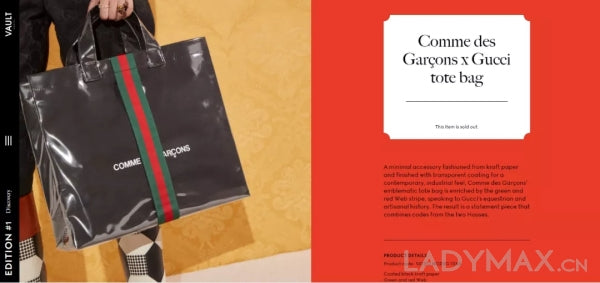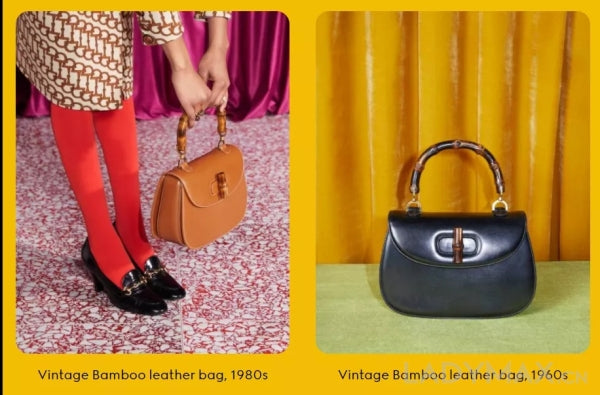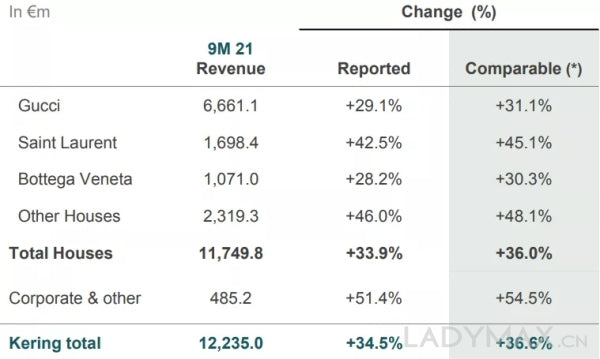Gucci, which celebrates its 100th birthday this year, is trying to seize the opportunity to catch up.
According to fashion business news, the income of Gucci parent company Kering Group in the third quarter increased by 12.6% year-on-year to 4.188 billion euros, and the comparable sales increased by 12.2%. The sales in the first nine months of this year rose by 34.5% to 12.235 billion euros.
During the reporting period, Gucci's sales, which accounted for nearly 60% of the group's performance, increased by 4.5% to 2.181 billion euros, and direct retail revenue recorded a 7% increase, which also increased by 2% compared with the same period in 2019. Revenue in the first nine months It rose by more than 29% to 6.66 billion euros, and the comparable sales rose by more than 31%, mainly benefiting from the successful launch of the DIANA bamboo handbag. The brand's 100th anniversary Aria series also received positive responses after it was launched on the shelves in late September.
Like the Jackie handbag that became popular in 2020, the DIANA bamboo handbag is also a classic new model. The prototype is Gucci's classic bamboo Tote handbag in the 1990s, which was favored by Princess Diana back then. On the basis of the prototype, Gucci's new DIANA bamboo handbag adds a detachable fluorescent color buckle to enhance the fashion of this replica handbag.

It is worth noting that the initial price of the DIANA bamboo handbag mini size has exceeded 20,000 yuan, and the price of the medium size has directly exceeded the 30,000 mark to 32,000 yuan. Due to the relatively neutral shape of the handbag, the medium-sized DIANA bamboo handbag also attracts the attention of male consumers.
In addition to Gucci, the revenue of Yves Saint Laurent, a brand under the Kering Group, also rose by 27.8% to 653 million euros, and rose by 42.5% to 1.698 billion euros in the first nine months; Bottega Veneta also recorded a 9.3% increase to 363 million euros, The first nine months increased by 28.2% to 1.07 billion euros; the revenue of other brands where Balenciaga is located rose by 26% to 843 million euros, and the first nine months rose by 46% to 2.319 billion euros.
By region, the Asia-Pacific market except Japan, where China is located, has become the main source of income for Kering Group. Taking Gucci as an example, the entire Asia-Pacific market contributed 46% of sales, followed by North America, accounting for 29%. Western Europe and the rest of the world accounted for 19% and 6%, respectively.
E-commerce has become the main growth engine of Kering Group. In the third quarter, sales increased by 24% year-on-year, and recorded a significant increase of 148% compared with the same period in 2019.
In a conference call after the release of the earnings report, Kering Group Chief Financial Officer Jean-Marc Duplaix emphasized that Gucci's development prospects are stable, and pointed out that the Chinese market is the core of the brand's continued success, because Chinese consumers have a strong appetite for new things , the group has full confidence in Gucci's products, price structure and brand strength.
He also revealed earlier that the loyalty of Chinese millennials to Gucci is increasing. In the first half of this year, Gucci's revenue in China nearly doubled compared to 2019, with two-thirds of the revenue coming from Gen Z and millennials.
On September 24th, Gucci adjusted the product price again. The GG Marant ultra-mini handbag with the original price of RMB 7,500 has now risen to RMB 8,200, an increase of 9%. The Rhyton series of printed sports shoes also rose from RMB 7,900 to RMB 8,200. The price of the mini series of handbags also broke through the 20,000 mark.
According to data disclosed by Gucci President and CEO Michael Bizzarri at the beginning of this year, Gucci's official website has been opened to 34 countries and regions around the world and is divided into 14 language versions, attracting a total of 270 million visitors last year. Driven by a series of digital innovative marketing, Gucci has also grown to 87 million followers on social media such as Facebook, Instagram, Weibo, WeChat and TikTok.
Careful observation is not difficult to find, whether in rational or emotional level, after 100 years of ups and downs, Gucci is infiltrating all senses of consumers with a younger face, which is inseparable from the brand's perseverance in innovation. Pursue.
In order to celebrate the 100th anniversary of the brand's founding, Gucci previously stated that it will increase the frequency of marketing activities. This year alone, it plans to hold as many as 150 Gucci limited-time stores around the world, using the "always on" marketing rhythm.
In June of this year, Gucci brought the "Aria-Fashion Aria" fashion series released through a short video two months ago to Shanghai. Creative director Alessandro Michele launched 13 new looks for the Shanghai show.

What is even more surprising is that after the show, Gucci turned the ideal Garden of Eden synthesized by computer technology in the previous short film into reality, and invited well-known dancer Qiu Jirong to perform a dance performance integrating traditional and contemporary, which became the fashion show. Special interpretation in the local cultural context.
At the same time, Gucci also held the "Original Classics of Gucci" exhibition in the Shanghai Exhibition Center, which set up multiple scenes with punch-in attributes for many images and elements of the "Aria-Fashion Aria" fashion show, and carried out a diversified display with the purpose of making Chinese consumption The audience can feel and appreciate the series products at close range, and have a deeper understanding of the brand.
If the presentation of these experiences is the perceptual level of the brand, then from the rational level, the most challenging proposition for luxury brands is undoubtedly how to simulate this seemingly irreplaceable offline experience in the digital world to the greatest extent possible. The most precise brand expression.
Now it seems that Gucci's online sales strategy is becoming clearer. The Gucci Tmall flagship store officially opened on December 21 last year, and the Gucci Beauty Tmall official flagship store was officially launched in February this year. Gucci spokesperson Lu Han also landed in Li Jiaqi's live broadcast room in March this year and released the Asian limited color of Gucci Soft Focus Condensing Powder.
As pointed out by the WeChat public account LADYMAX in an earlier report, the digital genes in the past six years and the brand's in-depth practice of digital marketing in the Chinese market have given Gucci more possibilities in the online world than other brands.
In order to make full use of the key point of the brand's 100th anniversary, this Italian luxury brand has not hesitated to mobilize all digital resources, from the short film of "Aria-Fashion Aria", to participating in the Christie's NFT art auction, to the advanced live broadcast mode of the Shanghai show. One did not attract the attention of the industry and consumers, but attracted the attention of consumers in all channels.
It is reported that Gucci will also usher in a series of activities and joint names at the end of the year to better grasp young consumers, such as the launch of Gucci and Balenciaga "The Hacker Project" (The Hacker Project) series, the centennial celebration, and in London, etc. The city opened the Circolo concept pop-up store and the launch of the new concept online space Vault, etc. In November, Gucci will also hold a fashion show in Los Angeles, USA.
Returning to the core product itself, in April this year, Marco Bizzarri said in an interview that Gucci will adjust the proportion of new and old products to 30% and 70%, because the brand has been focusing on millennials in the past few years. and Gen Z groups, but with the changing market environment, Gucci must now make new adjustments in order to capture the more purchasing power of traditional luxury consumers to meet their demand for timeless products.
In addition to changes in product and marketing strategies, Gucci is also constantly exploring new possibilities in terms of business.
In April this year, Gucci launched a variety of high-end Swiss-made watches based on the existing 4 watch series, which are divided into two versions: automatic movement and tourbillon movement. The price of automatic movement is between 8,500 euros and 11,000 euros. The tourbillon movement is priced between 120,000 and 170,000 euros, aiming to capture the growing demand for luxury watches from high-end consumers.
In June this year, Gucci also launched three sneakers made of DEMETRA environmentally friendly materials, the models are Gucci Basket, Gucci Ace and Gucci Rhyton. DEMETRA is a breakthrough high-end environmentally friendly material that takes into account quality, softness, durability, scalability and eco-friendly concepts. It is mainly produced by Gucci's factory in Italy and will be available to other brands in the future.
In order to better meet the needs of target consumers, Gucci released its first lifestyle series in September, incorporating the brand's classic logo into the complicated prints and details, presenting stationery and products not only covering puzzle games, travel suits and home wear series. , also include notebooks, various pens, pencil cases, folding fans and paperweights that you carry with you.
In addition, the Tote handbag that Gucci and COMME des GARÇONS collaborated again on was released on the Vault platform on October 15th to consumers in Japan, Europe and the United States, and it was quickly sold out. Driven by a series of initiatives, Gucci has been the most popular luxury brand among consumers in Lyst's quarterly list for two consecutive quarters.
Gucci has also established a partnership with Italian bank Intesa Sanpaolo to provide support for the ecological transformation of its suppliers, making it easier for suppliers to obtain bank credit to achieve business goals related to environmental, social and corporate governance, thereby promoting fashion Ecological transformation of the industry.
It is significant that Kering Group took the lead in targeting the second-hand market. In March this year, it invested 178 million euros in the second-hand luxury goods platform Vestiaire Collective together with Tiger Global Fund of the United States. Board of Directors. In June of this year, the group announced its stake in Cocoon, a British handbag rental company, to enter the rental market.
According to the data, Cocoon is headquartered in London and operates under a membership model. The first-month membership fee is 49 pounds, and then it will increase to 79 pounds or 99 pounds. In addition to Gucci, YSL, Bottega Veneta and other brands under the Kering Group, members can also Rent bags from luxury brands like Louis Vuitton, Dior, Chanel, Fendi and Prada.
At the beginning of September, Marco Bizzarri, who has led Gucci for 5 years, suddenly invested in Grailed, a second-hand luxury men's clothing trading website. Together with Groupe Artémis, the holding company of Pinault, the founding family of Kering Group, and investors such as Thrive Capital and Index Ventures, they joined the GOAT Group, the world's largest sneaker trading platform. raised a $60 million financing.
Jean-Marc Duplaix said that after high-speed growth, Gucci's future strategy will focus on the goal of long-term sustainable growth to explore greater market potential, and will continue to follow the current trajectory next year. Kering Group predicts that with the successive launch of Aria series products, Gucci will usher in a small peak in the fourth quarter, and revenue growth is expected to accelerate.
The rapid growth in sales of Yves Saint Laurent and Bottega Veneta in the quarter was mainly due to the boost of double-digit growth in North America and Europe, and their performance in the Asia-Pacific market was relatively flat. Jean-Marc Duplaix believes that, like Gucci, Yves Saint Laurent and Bottega Veneta need to strike a balance between fashion, innovation and timelessness.
In other words, the algorithm at the commodity level is extremely complex, but through precise calculation and balance, it can provide more reliable support for the long-term sustainable growth of the brand than increased marketing.
In the final analysis, ideally, the investment of luxury brands in marketing should eventually be converted into brand premium. Under the current market rhythm that consumers are buying instantly and brands are constantly on the go, the above-mentioned transformation process has been accelerated as never before, and Gucci's new round of sprints has just begun.
As of the end of the reporting period, Gucci had 388 stores around the world, approaching 400, and the number of Kering Group's stores around the world increased by 27 to 1,513.
